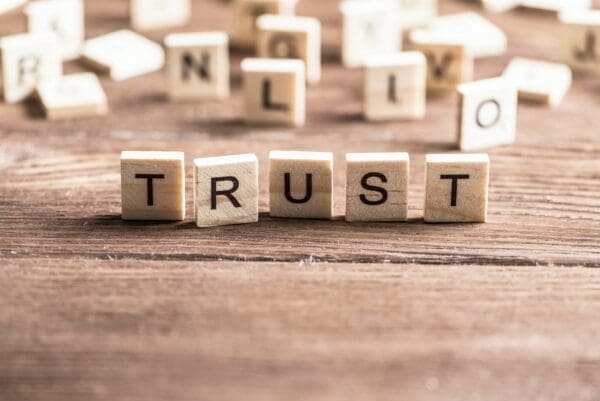Trust in Yourself and Your Team Today
There are many features of a great team. From great communication and coordination to a shared vision and common goals, there are many factors that contribute to a team’s success. However, one of the most important factors is trust. Trust is essential for a team to function properly and achieve its goals.
In fact, there are several reasons why trust is so important in teams. Throughout the rest of this expert guide, we’ll explore some of these reasons in greater detail, and offer you some key activities that you can use to build trust within your team.

Why Do Teams Need Trust and Accountability?
In order for teams to be successful, they need to be able to trust one another. This means that team members need to feel comfortable sharing information and ideas, and they need to feel confident that their teammates will not take advantage of them. Trust also helps teams hold each other accountable. When team members know that they can rely on each other, they are more likely to stick to their commitments and follow through on their promises.
Trust is especially important in remote teams, where team members may not have the opportunity to meet face-to-face on a regular basis. Without trust, it can be difficult for team members to build relationships and communicate effectively.
Related Reading: Team Building Skills Ultimate Guide
Why is Trust So Important in the Workplace?
The modern workplace relies on trust. Companies need their employees to trust one another to be able to get work done and to develop a wider value of trust throughout their business. This helps to communicate a culture of openness and honesty, which in turn can help a company be more successful.
In order to create a trusting environment in the workplace, managers need to model trustworthiness themselves. Employees also need to feel that they can trust their managers and co-workers to keep personal issues in confidence, to be fair and honest, and to be open to input and new ideas.
Trust is also important in relationships with customers. When customers feel that they can trust a company, they are more likely to do business with them. Furthermore, satisfied customers are more likely to spread the word about their positive experiences, which can help attract new customers. By ensuring a core value of trust runs through your workforce, you can create a more successful and sustainable business.

What are the Benefits of Trust in the Workplace?
Better Communication
When employees trust one another, they are more likely to communicate openly and honestly. This can help prevent misunderstandings and promote a better understanding of the company’s goals and objectives. In addition, team members who trust each other are more likely to feel comfortable giving and receiving feedback.

Higher Employee Retention
Employees who trust their co-workers are more likely to stay with the company for a longer period of time. By building trust in the workplace, you can create a more positive and supportive environment where employees are reluctant to leave, helping your business save on costs associated with turnover. Plus, with better employee retention comes a better brand reputation, which can benefit your company in the long run.
Reduced Costs
A workplace that runs on trust can help reduce costs associated with things like litigation, employee turnover, and absenteeism. When team members trust one another, they are more likely to resolve conflicts quickly and efficiently, without the need for outside intervention. In addition, employees who feel trusted are less likely to call in sick, saving the company money on lost days of work or productivity.
Improved Productivity
When employees trust their co-workers, they are more likely to be productive and efficient. This is because they feel comfortable working together towards a common goal, and they do not have to spend time worrying about whether or not their teammates can be trusted. By creating a trusting environment, you can encourage your team to work together more effectively and get more done.
Better Decision Making
When team members trust each other, they are more likely to make better decisions. This is because they are more likely to actively share information with one another and collaborate on solutions. Furthermore, employees who trust their co-workers are more likely to feel comfortable raising concerns and voicing dissenting opinions. This can help promote healthy debate and lead to better, more refined decisions in the long run.
Enhanced Collaboration
A trusting workplace encourages employees to work together more collaboratively. By trusting each other, employees feel more open to sharing ideas and collaborating on projects. This can lead to a wider variety of solutions and more efficient use of everyone’s time and skills. In addition, employees who trust one another are more likely to be supportive during difficult times, lending a helping hand when needed.
Increased Creativity

When team members trust each other, they feel more comfortable taking risks and being creative. This is because they feel secure in their environment and they know that their co-workers will not judge them for trying something new. Furthermore, employees who trust their co-workers are more likely to find increased creativity, allowing them to come up with better solutions to problems.
You Might Like: Leadership Skills Ultimate Guide
Why is Trust Important in Leadership?
When it comes to leadership in teams, trust becomes even more crucial.
Management and leadership teams that trust one another are more likely to be successful, as they are able to openly share information and collaborate on decisions. In addition, leaders who trust their teams are more likely to delegate tasks and give employees the freedom to work on their own. This can help promote creativity and innovation, which can be vital for a company’s success.
There are many reasons why trust is important in leadership, but some of the most important ones include:
- More efficient delegation of tasks: When leaders trust their teams, they will be able to effectively and efficiently delegate tasks. They know that they can trust their employees to complete the tasks assigned to them, without constant supervision. This can help leaders focus on more important tasks and allow their teams to work independently. Similarly, employees that have a trusting relationship with their manager will feel comfortable discussing their tasks and workload more openly and honestly, helping to avoid snowballing issues.
- More opportunities for employee development: When employees trust their leaders, they are more likely to take advantage of development opportunities. They know that their leader has their best interests at heart and they feel comfortable seeking guidance and feedback. Leaders who trust their teams are also more likely to give employees the freedom to experiment and try new things. This can help promote creativity, innovation, and development within the team.
- Stronger, more cohesive teams: In a trusting environment, team members are more likely to get along and work together effectively towards business goals and objectives. With better trust, you will gain a stronger, more cohesive team that can better weather difficult times and challenges.
How To Tell If You Have Trust in Your Team
There are a few key indicators that you have good trust in your team. If you find that:
- You feel comfortable delegating tasks and giving employees the freedom to work independently.
- You have strong relationships with your team members and you feel like you can openly communicate with them.
- Your team is cohesive and works well together.
- Your team is creative and innovative.
- You feel like your employees are eager to develop and support this.
Then it’s likely that you have good trust in your team. If you don’t feel comfortable with any of the above, then it may be an indication that you need to work on developing trust within your team. A qualified business growth coach can help you determine exactly what your team needs to build trust and improve performance.
8 Ways To Build Trust in Your Team

Set Clear Expectations
When team members know what is expected of them, they are more likely to trust their leader.
Leaders should be clear about what they want from their team and what is required of them. In addition, leaders should be transparent about their own goals and objectives, letting team members know where they are heading. This can help team members feel like they are a part of the process and that their contributions are valued.
Create Open Communication Channels
Open communication channels are key to building trust in a team. Leaders should make sure that they are readily available to answer any questions and that they encourage employees to communicate with them openly. In addition, leaders should be transparent about their decision-making process, letting team members know how they reached certain conclusions.
Encourage Employee Feedback
Employee feedback is essential for building trust in a team. Leaders should encourage employees to give their honest opinions and suggestions, letting them know that their input is valued. Furthermore, leaders should act on employee feedback when possible, as this will show employees that their suggestions are being heard and that they are making a difference.
Create a Safe Environment
A safe environment is one in which team members feel comfortable taking risks and trying new things. Leaders should create an environment where employees feel like they can openly share their ideas without fear of judgement or reprisal. Furthermore, leaders should encourage employees to experiment and take risks, as this can lead to new innovations and breakthroughs.
Work with a Business Coach
If you are struggling to build trust in your team, consider working with a small business coach. A business coach can help you identify the areas where you need to improve and can offer guidance on how to effectively build trust within your team with an aim for business growth. Business coaches can also help you develop trust within yourself and your business, which can be essential for leading a team effectively.
Be Consistent
Trust is built over time through consistency. Leaders should be consistent in their words and actions, letting team members know that they can rely on them. Furthermore, leaders should follow through on their promises and commitments, as this will show team members that they can be trusted.

Recognise Individual Achievements
When team members feel like their individual achievements are being recognised, they are more likely to trust their leader. Leaders should make an effort to praise team members for their accomplishments, letting them know that they are appreciated. In addition, leaders should take the time to learn more about each team member’s individual strengths and weaknesses, as this can help them better utilise their skills.
Invest in Employee Training
One way to help create a safe environment that promotes trust in the workplace is to invest in employee training. Training can help employees feel more confident in their abilities and can provide them with the skills they need to succeed. Furthermore, training can help employees feel like they are part of a team and that their leader is invested in their development.
Whether you decide to offer training in role-related skills, or to train your management in Mental Health First Aid, investing in your team’s development will go a long way in building trust.
Promote Honest Communication
Honesty is essential for building trust in a team. Leaders should encourage employees to be honest with one another and with themselves. In addition, leaders should be truthful and transparent in their own communications, letting employees know what they can expect from the company and from their leader at all times.
Read More: Communication Skills Ultimate Guide
Lead by Example
The best way to build trust in a team is by leading by example. Leaders should set the tone for the team by being honest, reliable and trustworthy. In addition, leaders should be willing to put in the extra effort to get the job done and should lead by example in terms of work ethic and attitude.
By ensuring that you are leading by example, you will be setting the stage for a team that is built on trust. This will allow for a more productive and positive work environment in which everyone can succeed.
Team-Building Days
A team-building day can be a great way to build trust within a team. Team-building activities help employees get to know each other better, learn more about their individual strengths, and work together towards a common goal. When team members trust one another, they are more likely to collaborate effectively and work together towards collective success.

Some examples of team-building activities include:
- Scavenger hunts: Scavenger hunts make for a fun and challenging team-building activity. Split employees into teams and give them a list of items or tasks to complete within a set amount of time.
- Team quizzes: Test employees’ knowledge with a team quiz. Split employees into teams and give them a list of questions to answer. The team with the most correct answers wins. Alternatively, you can do virtual team quizzes using online tools such as Quizizz or Kahoot.
- Escape rooms: Escape rooms are a great way to test team-building skills. Teams must work together in order to solve puzzles and escape the room before time runs out. This offers a great opportunity for employees to learn more about each other’s strengths and weaknesses and develop trust.
- Team trips: Take employees on a team trip to somewhere they have never been before. This can help employees bond and develop trust with one another. Team trips can be educational, adventurous, or relaxing – whatever you choose, make sure it’s something that everyone will enjoy.
By investing in trust-building activities, you can create a more cohesive and effective team in a fun and exciting way. We recommend making team-building exercises a regular part of your yearly calendar, as this will help ensure that employees keep up their trust-building skills.
Final Thoughts
The benefits of trust in the workplace are vast and can have a positive impact on every aspect of your business. By creating a trusting environment with some of our activities listed above, you can help your team work more effectively together, make better decisions, and become more productive.
Furthermore, a trusting workplace can help improve employee retention, reduce costs, and enhance collaboration, giving your business the boost it needs to grow.
So, what are you waiting for? Start building trust in your workplace today!




